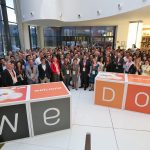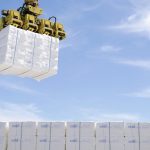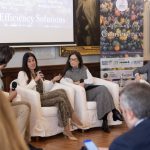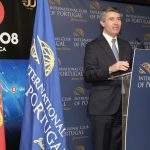Dutch businessman Erik de Vlieger turns ruins into modern homes
Special Feature by Michael Bruxo ([email protected])
Dutch businessman Erik de Vlieger is developing seven major projects in Lagoa, which include turning derelict buildings into shiny new developments and building a “high performance sports centre”. The total market value of the projects amount to nearly €132 million.
Most people would likely jump at the chance of enjoying a semi-retirement in the Algarve.
Dutch businessman Erik de Vlieger gave it a try in 2006, becoming a shareholder at Carvoeiro Clube after moving from Amsterdam to the Algarve and working at whatever time he wanted to. But years later, he realised that he loved and missed the daily grind of full working days too much to leave it behind.
“I was that typical Northern European, semi-retired businessman who could go to work whenever he wanted,” Erik de Vlieger told Essential Business and the Resident.
“But I am a businessman, and I am addicted to work. Around 2014-2015, I got fed up. I like to be at the office at 8.30am and go home at 6pm or 7pm. So, I had to make a choice: make a bit of money off buying and selling plots of land or start my own company.”
The result was the creation of Carvoeiro Branco, a real estate development company which has already completed the renovation of landmark buildings such as Atrium Lagoa, which was transformed from a decades-old apartment block into a vibrant residential and commercial building, and Atrium Arade, the famous riverside building in Portimão previously known as Mabor.
Now, seven major projects are being developed by Carvoeiro Branco in the Lagoa borough, amounting to a total market value of €131.9 million.
Among the most remarkable is Match Lagoa (€12 million), described as a “high-performance centre for elite teams and athletes”. The complex, due to be built on a seven-hectare plot of land between Lagoa and Carvoeiro, will feature two outdoor hybrid football pitches, a state-of-the-art fitness facility and rehabilitation and sports science areas, as well as a 40-bedroom hotel.
The project is in the process of receiving its final licences – if all goes well, by May or June.
“Our plan is to start building immediately after this,” Erik told us. “This project is crying to be made in Lagoa. It will provide 12 months of activity, it will bring business to local hotels and resorts, and it will bring stability,” the businessman told us.
The plan is to have the centre open 18 to 24 months after construction begins. Vale da Pipa (€65 million) is another of Carvoeiro Branco’s cornerstone projects. Due to be built on the outskirts of Lagoa, the residential development will boast 304 apartments.
“We are developing it as affordable houses for young families, with one or two children, who can afford to pay a €600-€700 monthly mortgage,” said de Vlieger, stressing the importance of creating affordable housing for the region’s young residents.
“People who have finished university will usually leave the Algarve and never come back. They aren’t able to find a house unless they search in the most remote areas of the region or end up living with their parents. This project is for those people,” he said.
The Dutch businessman also criticised the “selfishness” of most project developers in Algarve, who “only develop projects for foreigners with spending power and rich Portuguese”.
Another project in the works is Prime Life (€13.2 million), a luxury resort in Carvoeiro featuring 30 apartments, which fits in perfectly with the company’s philosophy of urban rehabilitation.
“This is a project that has been marked by conflict for 10 years, as the developer had started building it and went bankrupt when it was 25% complete. I bought it, cleaned it up and will now be finishing it,” said de Vlieger, adding that it will be located near Vale do Milho.
The successful Atrium Lagoa project will serve as inspiration for Atrium Liberdade (€7.2 million), currently a “block of ruins” in the historical centre of Lagoa which is going to be knocked down to build 33 apartments for a mix of markets.
One of the projects Erik de Vlieger spoke about with a particular fondness was Monchique View Carvoeiro (€22 million), which will be built on a plot of land in Vale de Milho.
“Developers are always focused on the sea because buyers come to the Algarve to enjoy the sun and the beaches, which are facing south. But I love the north views. I bought a plot for myself with a view to Monchique. The sea views almost always look the same, but when I look to Monchique, I see the lights, the clouds, the fog. I’m really fond of this view, I love it,” he said.
Carvoeiro Branco is also in the process of developing two other projects: Arade Premium Village (€9.5 million), which includes 20 apartments and villas to be built in the Bela Vista area in Parchal; and Atrium Residence Lagoa (€3 million), a residential project to be built on Rua Coronel Figueiredo on the town’s so-called ‘Red Street’.
Real estate tips on YouTube
Carvoeiro Branco is also branching out into the digital world, with a heavy social media presence and the launch of a new series of YouTube videos in which Erik de Vlieger provides insight into the Portuguese real estate market.
Videos range between just one or two minutes and see the businessman offering tips and advice about investing in Portugal and the Algarve.
For example, Erik de Vlieger believes there is “no way but up” for the country’s property market, especially if there is a peaceful resolution to the war in Ukraine soon.
“If there is peace there, I think the market will be insane in Portugal,” said de Vlieger, adding that the “lack of enough good product” in Portugal will keep prices stabilised.
Search for ‘Carvoeiro Branco’ on YouTube to see the videos.
“I’ve given up on Portimão”
Despite having successfully breathed new life into the town’s riverside Mabor building – a project which nonetheless took 10 years to complete – the “lack of openness” from the local council to work alongside him has led Erik de Vlieger to abandon further plans for development in Portimão.
Erik, who in 2016 co-wrote the book Criar um Paraíso Urbano (Creating an Urban Paradise) with well-known local journalist José Garrancho, said he offered the book to the local council and never received a response.
This was not the first time that he had never received an answer from the council, he added.
“I’ve always thought that one of the big jewels of the Algarve was Portimão’s Zona Ribeirinha (riverside), so I created a big plan to restore all the buildings – no one was interested. Local councils in Portugal sometimes don’t know the beauty they have under their control,” he lamented.
Instead, de Vlieger said he will be focusing on opportunities in other boroughs such as Albufeira, Faro, Tavira and even Vila Real de Santo António.
“Algarve needs different industries”
As the Covid-19 pandemic proved, the tourism sector is the first to be hit during any major international crisis. And the Algarve’s economy remains heavily, if not completely, reliant on tourism.
“What I believe needs to be done is that local councils in the Algarve need to work together to attract different industries,” said de Vlieger, who suggested everything from the manufacturing of glass fibre to IT centres.
“It would be great to have a call centre from Google or a development team from Amazon,” he said, stressing the importance of diversifying the region’s economy.
“We need to have other industries in the Algarve,” he said.
Who is Erik de Vlieger
Erik de Vlieger visited the Algarve for the first time in 1996 and was struck by the “space” that existed in the region. The first thing he noticed, after stepping out of the plane, was the smell of pine trees, he recalled.
He moved to Portugal in 2006 after selling his company in the Netherlands and travelled the entire country, investigating and deciding where he wanted to stay. “But I was always pulled to the Algarve,” he said.
He bought a house in Carvoeiro that he fell in love with, describing his choice as a “coincidence, much like many things in life”.
His favourite time of the year are the eight months outside of the summer season, when he wakes up, opens the curtains and sees the clear sky – the “ultimate happiness”, he said.
Erik believes that the energy he gets from breathing new life into derelict buildings or ruins is something that will help him live longer and says that providing affordable housing for local residents is something he is “fanatical” about.










